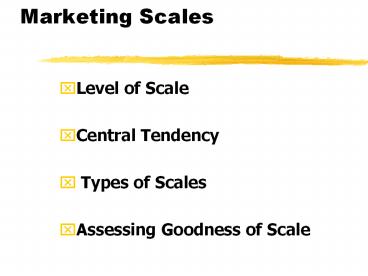Marketing Scales - PowerPoint PPT Presentation
1 / 23
Title:
Marketing Scales
Description:
Nominal scale which partitions objects into mutually exclusive and ... among different measurement instruments that purport to measure the same concept. ... – PowerPoint PPT presentation
Number of Views:44
Avg rating:3.0/5.0
Title: Marketing Scales
1
Marketing Scales
- Level of Scale
- Central Tendency
- Types of Scales
- Assessing Goodness of Scale
2
Levels of Measurement of Scales
- Nominal scale which partitions objects into
mutually exclusive and collectively exhaustive
categories numbers simply used as labels
numbers used to categorize objects.
3
Levels of Measurement of Scales
- Ordinal scale in which order of objects is
known usually rank-order scales.
4
Levels of Measurement of Scales
- Interval scale in which distance between each
descriptor is known.
5
Levels of Measurement of Scales
- Ratio scale in which a true zero origin
exists the value of zero means that the entity
possesses none of the characteristic
6
Marketing Scales
- Likert - assesses degree of agreement/disagreement
with statement.
7
Marketing Scales
- Semantic Differential - scale anchors are bipolar
adjectives.
8
Marketing Scales
- Graphic Rating Scale - pictures represent
descriptors.
9
Marketing Scales
- Stapel Scale - uses range of numbers, from x to
x to indicate intensity of response.
10
Marketing Scales
- Percentage Scale - uses percentages to indicated
intensity of response.
11
Marketing Scales
- Constant Sum Scale - respondents need to divide
numerical responses in such a way that total
score is constant
12
Construct (Concept)
- Characteristic of an entity that varies.
- Manifest concrete (age, gender, income)
- (one indicator is usually enough to measure
the construct.)
13
Construct (Concept)
- Characteristic of an entity that varies.
- Latent - abstract concepts that you cant easily
see (variety-seeking, intelligence) - (usually need multiple indicators to
- measure the construct.)
14
Reliability
- Degree to which measures are free from random
error and therefore yield consistent results.
15
Measures of a Scales Reliability
- Repeatability - administer the same scale to the
same respondents at two separate points in time.
16
Measures of a Scales Reliability
- Internal consistency - if a scale is internally
consistent, it should generate roughly the same
result by dividing the scale into parts.
17
Validity
- Ability of a scale to measure what it was
intended to measure.
18
Validity
- Face (Content) Validity degree to which items
appear to measure what they are intended to
measure.
19
Validity
- Predictive validity degree to which some future
event can be predicted by a current measurement
scale.
20
Validity
- Convergent validity degree of association
among different measurement instruments that
purport to measure the same concept.
21
Validity
- Discriminant validity refers to a lack of
association among constructs that are supposed to
be different.
22
Validity
- Concurrent validity degree to which a variable,
measured at the same point in time as the
variable of interest, can be predicted by the
measurement instrument
23
If a measure is valid, it has to lack both random
and systematic error.Reliability is a necessary
but not sufficient condition for validity.

